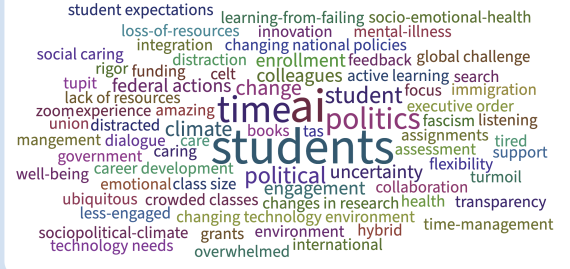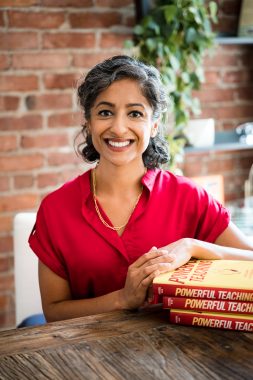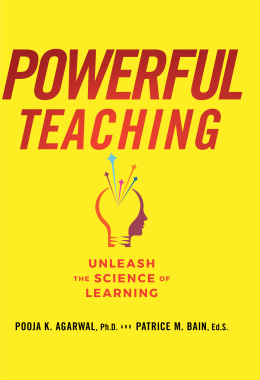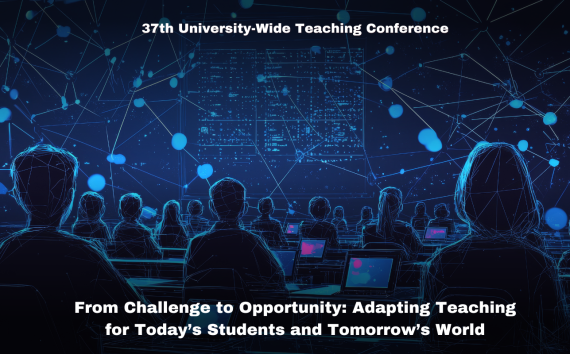37th University-Wide Teaching Conference
From Challenge to Opportunity: Adapting Teaching for Today’s Students and Tomorrow’s World
The science of learning sheds light on the potential of today’s learner and provides powerful tools for educators to unlock that potential. Insights from the science of learning are increasingly critical as faculty face a growing array of challenges, including shifting student needs, motivations, and behaviors, as well as the pressures of political, economic, and technological transformations on the whole University and our work as educators. This year’s 37th Annual University Wide Teaching Conference, From Challenge to Opportunity, will focus on how to adapt our teaching for today’s students and the rapidly approaching world of tomorrow.
We will explore these themes with a keynote by Dr. Pooja K. Agarwal, cognitive scientist, educator, and author of the book Powerful Teaching: Unleash the Science of Learning. Dr. Agarwal will help us explore how decades of research have uncovered powerful, intuitive, and easily-implemented strategies that dramatically raise student achievement, particularly in our current complex landscape. Then throughout the day, discover ways your colleagues at Tufts are adapting their teaching to meet these demands, share your own innovative approaches, and engage in a collaborative exchange of ideas to enhance learning and teaching in today’s dynamic world.
Which factors have been most influential—whether challenging or beneficial—in shaping our teaching experiences this past academic year?

Keynote Address by Dr Pooja K. Agarwal, Associate Professor, Berklee College of Music
 Powerful Teaching: How to Unleash the Science of Learning in your Classroom
Powerful Teaching: How to Unleash the Science of Learning in your Classroom
Dr. Pooja K. Agarwal (she/her), cognitive scientist, educator, and author of Powerful Teaching: Unleash the Science of Learning, shares evidence-based strategies that can be implemented in less than a minute—without additional prep or grading—to meet the evolving challenges of today’s higher education landscape. In a time of political, economic, and technological pressures, faculty still have the ability to shape learning in meaningful ways. As faculty navigate shifting student needs, rising mental health concerns, and the growing influence of AI and social media, research from the science of learning offers powerful, intuitive solutions to improve student engagement, resilience, and achievement. This keynote will help you think critically about teaching from a research-based perspective and provide actionable strategies to transform learning in your classroom—even in the face of rapid change.
Links:
Speakers Website for the Tufts presentation
Zoom recording (YouTube Link)
11am Concurrent Breakouts Sessions
Virtual Short Talks Session 1
Setting Students Up for Graduate School Success- Skills, Strategies, and Support, Amy Schlessman, PT, DPT, DHSc, Dept of Rehabilitation Science, TUSM
"Setting Students Up for Graduate School Success: Skills, Strategies, and Support" presents a comprehensive 12-week online program designed to prepare students for the rigors of graduate school. This program covers essential skills such as evidence-based learning strategies, study skills, time management, stress management, and work-student-life balance. It also emphasizes well-being, mindfulness, the use of AI for learning and test preparation, effective test-taking strategies and how to build a supportive online community with classmates through both synchronous and asynchronous interactions. The presentation includes an overview, program outline, and testimonials from past participants.
The Impact of Pedagogical Partnership on Students Professional Skills and Lives, Nessren Ourdyl (A/S '25), Heather Dwyer (CELT), Carie Cardamone (CELT)
Pedagogical partnership programs offer opportunities for student development in student-faculty partnerships, yet little research explores their role in post-graduate preparedness amid rapid changes. As faculty adapt to increasing AI growth, economic pressures, and equity efforts, partnerships offer strategies for fostering engagement, career readiness, and insight to student needs. Through interviews with former student partners in Tufts’ Pedagogical Partnership Program, we examined how their experiences shaped professional and academic trajectories. Participants attributed it to developing relationship-building, communication, navigating power dynamics, and equity-focused skills. This presentation highlights how pedagogical partnerships enhance 21st Century career readiness and personal development, particularly for underrepresented students.
Virtual Roundtable: Globalizing Health Education: A Model for Public Health Curriculum, Shayesteh Jahanfar (Public Health & Community Med, TUSM)
This presentation highlights an innovative approach to globalizing health education through three key strategies. First, international and national guest speakers expose students to diverse health perspectives, with structured video feedback fostering critical reflection. Second, partnerships with global universities provide experiential learning through research exchanges, immersing students in different healthcare systems. Third, e-portfolios document global experiences, showcasing students’ cross-cultural learning. These strategies enhance global competence, preparing future public health professionals to address health disparities worldwide and offering a replicable model for internationalizing health education.
Zoom meeting notes & slides & flyer for author training
Roundtable: Navigating the Information Maze: Understanding Reading, Writing, and Research Skills in the Digital Age, Jennifer Ferguson (Tisch Library), Kristina Aikens (StAAR Center), Jean Otsuki (CELT)
Students' research and writing skills are linked to their ability to read and analyze information critically. However, this ability has declined with the rise of smartphones, social media, and other algorithmically driven information systems, and 54% of US adults now read at or below a sixth-grade level. This roundtable will explore students' current information consumption habits, using Tufts student data from the latest Project Information Literacy Study, “How Information Worlds Shape Our Response to Climate Change,” recent research on reading and cognition, and faculty observations to develop strategies for supporting students in their classes with these crucial skills.
Workshop: Enhancing Engagement and Collaboration: Transforming Asynchronous Learning in Geriatric Dentistry with Perusall and Padlet, Dr. Karin Arsenault (Public Health and Community Service, Dental), Leah Mathie (Perusall)
Asynchronous learning is a key component of modern dental education, offering flexibility but posing challenges such as student isolation, reduced engagement, and limited opportunities for real-time feedback and collaboration. These issues are particularly relevant in geriatric dentistry, where complex patient cases require critical thinking, reflection, and discussion. This workshop examines how a second-year geriatric dentistry course at Tufts University School of Dental Medicine integrates Perusall and Padlet to enhance engagement, foster peer collaboration, and reinforce key concepts. By leveraging evidence-based strategies, these tools transform passive study into an interactive and cognitively rich learning experience.
Workshop: Teaming up with undergraduate Learning Assistants (LAs) to foster active and inclusive learning environments, Ira Caspari-Gnann (Chemistry, AS&E), Kristen Wendell (Mechanical Engineering, AS&E)
In the Learning Assistant (LA) model, faculty include undergraduate Learning Assistants (LAs) on their instructional teams in order to facilitate active learning and to foster inclusive learning environments. This workshop will serve as an introduction to the LA model. Participants will hear about the essential elements of the model, analyze videos from LA-supported courses, and consider how adding LAs to their courses could work in their own contexts. Workshop facilitators include both former LAs and faculty who have experience working with LAs in science and engineering classes.
12pm Concurrent Breakouts Sessions
Virtual Roundtable: Empowering Student Learning: Adapting Program-Wide Canvas Design with a Focus on Inclusion, Accessibility, and Individual Creativity, Sarah Gilliland PT, DPT, PhD; Neeti Pathare PhD; Kim Dao PT, DPT; Micheal Clarke PT, DPT (TUSM Dept of Rehabilitation Sciences)
Online teaching requires clear structure and content formatting to effectively guide student learning. A Canvas course template provides consistency and efficiency for hybrid education, allowing students to focus on course content rather than how to navigate the space. The Doctor of Physical Therapy programs (90 courses with 50 faculty) use an intuitive template integrating best practices in universal design and accessibility while providing flexibility for faculty individualization with course-specific student needs. In this roundtable 4 faculty demonstrate how they integrate learning science principles in distinct, multiple course designs within a consistent template to reinforce learning. Faculty and instructors are welcome to get in touch about LockDown Browser and Rumi by emailing edtech@tufts.edu
Short Talks Session 2
‘Another World is Possible’: Using Music and Generous Listening to Create a More Equitable Classroom, James J. Fisher (GLADi, Jonathan M. Tisch College of Civic Life)
This presentation will discuss the use of music and Generous Listening to create a more equitable classroom. It presents an aural pedagogy which centers the use of music applied to specific lessons—for example, using the song “They Schools” by the hip-hop duo Dead Prez to teach the history of education in the United States—which illuminate under-represented voices in history and in the contemporary world. Likewise, an emphasis on Generous Listening—listening to understand one another better in our common humanity, rather than listening simply to respond—allows for both instructor and students to better communicate, equitably encourage student voices, and co-create knowledge in the classroom.
Building research and pedagogical capacity in undergraduates, Revati Masilamani (MedEd, TUSM), Rasha Baig (TUSM), Sara Dolan (AS&E)
Every summer, we run a high school focused research program called Lab Science Investigations. High school students learn about Antimicrobial Resistance in the context of One Health along with gaining authentic research skills in a large cohort. Undergraduates are recruited as teaching assistants for the program, and are trained in experimental methodology as well as pedagogy- both laboratory and class-room teaching focused. Undergraduates learn how to run experiments, troubleshoot for their mentees, identify and address alternate conceptions and inclusive teaching practices. We will share our approaches to teaching, our preliminary outcomes, and would like to open up the discussion to ways in which this approach can be scaled so access can be broadened to a larger cohort of undergraduates.
Retrofitting STEM Courses for Increased Inclusion Erica Kemmerling (Mechanical Engineering, AS&E)
Many STEM courses utilize traditional teaching techniques that were developed when STEM was overwhelmingly white and male. As our student body becomes more diverse, we need to adapt our methods so we serve students of diverse identity groups equally well. Overhauling teaching methods is a challenge for busy STEM instructors, so this presentation will focus on small, low-time-commitment retrofits one can make to an already-established STEM course that have been shown by education researchers to make a positive difference on the success of marginalized students. A more extensive guide to practical inclusive teaching strategies in STEM is linked here.
Workshop: Transformative Social Emotional Learning (tSEL) for Wellbeing and Inclusive Excellence, Deborah Donahue-Keegan (Education Department / Civic Studies; Faculty Fellow, Tufts Office of Institutional Excellence (IIE)), Sehba Hasan (Center for STEM Diversity; Engineering Education, PhD in progress), Claudia Ly (Educational Studies, MA in progress)
In this interactive session, we will explore why and how integrating transformative SEL (tSEL) into higher education classrooms can foster wellbeing and inclusive excellence across disciplines. We will share an overview of the five core tSEL competencies (and the focal construct for each): self-awareness (identity); self-management (agency); social awareness (belonging); relationship skills (collaborative problem-solving); responsible decision-making (curiosity). We will also share research-based connections between tSEL and equitable engaged learning, with attention to the vital role of faculty instructors' own tSEL practices. The session will include brief reflective writing, pair-share conversations focused on a vignette, and ideas for pedagogical application.
Roundtable: Contrasting Assessment Strategies in the Age of AI: A Discussion with Faculty Users of Rumi and Respondus, Jake Dempsey, Freedom Baird, Justin Horvath, Jamie Cannan (ETS)
Hear from three Tufts faculty members – Cody Doucette, Steve Muscolino, and Amy Hirschfeld – who recently piloted two contrasting methods of assessment. Rumi is a writing assignment tool which allows instructors to closely supervise the writing process. LockDown Browser is a proctoring tool which prevents students from accessing other content while taking a Canvas exam, and can record their screen and webcam. Faculty will share insights about how these tools helped them assess what their students actually know and can do. ETS staff hosts will then facilitate a discussion among attendees on the challenges of giving assessments in the age of AI, and on how these tools can help prevent students from circumventing their learning.
For location information & Zoom registration links please view the online program here.
Reading Group: Agarwal and Bain's Powerful Teaching
 Wednesday, May 7th, 10:30 - 11:30 (in person)
Wednesday, May 7th, 10:30 - 11:30 (in person)
Thursday, May 8th, 12:00 - 1:00pm (Zoom)
What does research tell us about how we learn, and how can we implement these findings in our classrooms? Join your colleagues for a discussion of Pooja Agarwal and Patrice M. Bain’s Powerful Teaching. Dr. Agarwal will be our keynote speaker for the University-Wide Teaching Conference on May 20. This reading group is open to faculty and graduate students.
In preparation for the reading group discussion, please read chapters 3 (Retrieval Practice Strategies) and 8 (Fostering Community and Reducing Anxiety), available in electronic version through the library.
The 37th University Wide Teaching Conference is sponsored by Tufts University Committee for Teaching and Faculty Development, the Center for the Enhancement of Learning & Teaching and The Office of the Vice Provost for Education.
